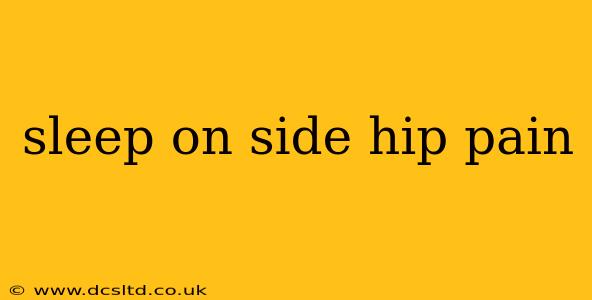Many people find sleeping on their side the most comfortable position, but for some, this seemingly innocuous posture can lead to significant hip pain. This pain can stem from various sources, making diagnosis and treatment crucial for a good night's rest and overall well-being. This comprehensive guide delves into the common causes of side-sleeping hip pain, offering effective solutions and preventative measures.
What Causes Hip Pain When Sleeping on My Side?
Hip pain while sleeping on your side isn't usually caused by a single, easily identifiable issue. Instead, it's often a combination of factors contributing to the discomfort. These include:
-
Poor sleeping posture: Sleeping in a fetal position with your knees drawn up tightly towards your chest can compress your hip joint and surrounding muscles, leading to pain and stiffness. Similarly, sleeping with your legs completely straight can also strain your hips.
-
Underlying medical conditions: Conditions like bursitis (inflammation of the hip's fluid-filled sacs), osteoarthritis (degenerative joint disease), tendinitis (inflammation of tendons), and sciatica (nerve pain radiating down the leg) can significantly worsen hip pain during sleep. These conditions often manifest as increased pain when pressure is applied to the hip joint, as occurs when lying on your side.
-
Muscle imbalances: Weak or tight hip flexors, gluteal muscles, or hamstrings can contribute to improper hip alignment, making side sleeping more painful. This imbalance can put extra strain on the hip joint during sleep.
-
Mattress and pillow choices: An unsuitable mattress that doesn't provide adequate support or the wrong type of pillow can exacerbate hip pain. A mattress that’s too soft can cause your hip to sink too deeply, putting pressure on the joint, while a firm mattress might not provide sufficient cushioning.
-
Pregnancy: Hormonal changes and the added weight during pregnancy can significantly impact hip joints, increasing the likelihood of pain, especially during side sleeping.
Why Does My Hip Hurt More on One Side When Sleeping?
This is a common question and often points to a specific underlying issue. Pain localized to one side suggests an imbalance or injury concentrated in that hip. It could be due to:
-
Previous injury: A past hip injury, even a seemingly minor one, can cause lingering weakness or inflammation that manifests as pain during sleep.
-
Muscle imbalances: As mentioned earlier, uneven muscle strength and flexibility between the two hips can lead to disproportionate pressure and pain when lying on your side.
-
Degenerative conditions: Conditions like osteoarthritis often affect one hip more severely than the other.
How Can I Reduce Hip Pain When Sleeping on My Side?
Several strategies can help alleviate hip pain associated with side sleeping:
-
Improve your sleeping posture: Try sleeping with a pillow between your knees to maintain hip alignment and reduce strain on the joint. This helps keep your spine in a neutral position. Experiment with different pillow sizes and thicknesses to find what works best. You might also consider placing a pillow under your waist to support the natural curve of your spine.
-
Address underlying medical conditions: Consulting a physician or physical therapist is crucial if you suspect an underlying medical condition is contributing to your hip pain. They can diagnose the problem and recommend appropriate treatment.
-
Strengthen your core and hip muscles: Regular exercise focusing on strengthening your core, glutes, and hip flexors can significantly improve hip stability and reduce pain. A physical therapist can create a tailored program for your needs.
-
Improve your sleep environment: Invest in a supportive mattress and pillows designed to promote proper spinal alignment. Consider a medium-firm mattress; avoid extremely soft or hard surfaces.
-
Use pain relief strategies: Over-the-counter pain relievers like ibuprofen or naproxen can temporarily alleviate pain. Apply ice or heat packs to the affected area for pain relief. Always consult your doctor before using any pain medication.
-
Consider sleeping positions: Experiment with other sleeping positions such as sleeping on your back with a pillow under your knees and lower back.
What Pillow is Best for Side Sleepers with Hip Pain?
The best pillow for a side sleeper with hip pain is one that supports the natural alignment of the spine and reduces pressure on the hips. A body pillow or a wedge pillow can be particularly helpful in keeping your hips and spine aligned. Experiment with different pillow types and placements to find the optimal configuration for your body.
Should I See a Doctor About My Hip Pain?
If your hip pain persists despite trying various home remedies, or if the pain is severe, accompanied by other symptoms like fever, swelling, or limited range of motion, it's essential to consult a doctor. They can conduct a thorough examination and determine the underlying cause of your hip pain, recommending appropriate treatment or referring you to a specialist.
By understanding the potential causes of side-sleeping hip pain and implementing the strategies outlined above, you can improve your sleep quality and significantly reduce or eliminate discomfort. Remember, consulting with healthcare professionals is vital for proper diagnosis and treatment.
